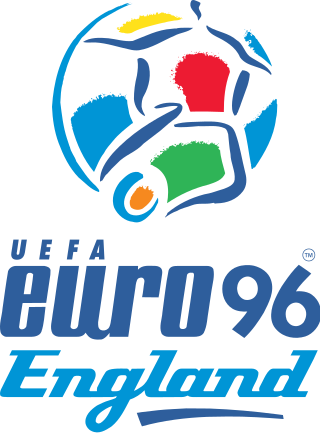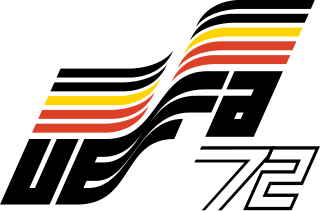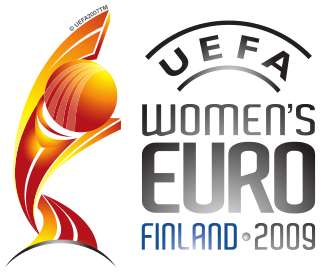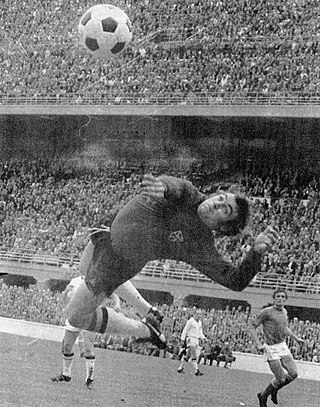
The 2000 UEFA European Football Championship, also known as Euro 2000, was the 11th UEFA European Championship, a football tournament held every four years and organised by UEFA, the sport's governing body in Europe.

The 1996 UEFA European Football Championship, commonly referred to as Euro 96, was the 10th UEFA European Championship, a quadrennial football tournament contested by European nations and organised by UEFA. It took place in England from 8 to 30 June 1996. It was the first European Championship to feature 16 finalists, following UEFA's decision to expand the tournament from eight teams.

The 1972 UEFA European Football Championship final tournament was held in Belgium. This was the fourth UEFA European Championship, held every four years and endorsed by UEFA. The final tournament took place between 14 and 18 June 1972.

The 1968 UEFA European Football Championship final tournament was held in Italy. This was the third UEFA European Championship, an event held every four years and organised by UEFA. The final tournament took place between 5 and 10 June 1968.

The 2008 UEFA European Football Championship, commonly referred to as UEFA Euro 2008 or simply Euro 2008, was the 13th UEFA European Championship, a quadrennial football tournament contested by the member nations of UEFA. It took place in Austria and Switzerland from 7 to 29 June 2008.
The 1984 European Competition for Women's Football was won by Sweden on penalties against England. It comprised four qualifying groups, the winner of each going through to the semi-finals which were played over two legs, home and away. As only sixteen teams took part, the competition could not be granted official status. Matches comprised two halves of 35 minutes, played with a size four football.
The 1997 UEFA Women's Championship, also referred to as Women's Euro 1997 was a football tournament held in 1997 in Norway and Sweden. The UEFA Women's Championship is a regular tournament involving European national teams from countries affiliated to UEFA, the European governing body, who have qualified for the competition. The competition aims to determine which national women's team is the best in Europe.

The 2009 UEFA Women's Championship, or just Women's Euro 2009, was played in Finland between 23 August and 10 September 2009. The host was appointed on 11 July 2006, in a UEFA Executive Committee meeting in Berlin and the Finnish proposal won over the Dutch proposal.

The 2013 UEFA Women's Championship, commonly referred to as Women's Euro 2013, was the 11th European Championship for women's national football teams organised by UEFA. The final tournament, held in Sweden from 10 to 28 July 2013, became the most-watched in the history of the Women's Euros. It concluded with Germany, the defending champions, winning their sixth consecutive and eighth overall Women's Euro title after defeating Norway in the final.
The Qualifying rounds for the UEFA Women's Euro 2013 determined which 11 teams joined Sweden, the hosts of the 2013 tournament, to play for the UEFA Women's Championship.

The 2015 UEFA European Under-21 Championship was the 20th edition of the UEFA European Under-21 Championship, a biennial international football competition for men's under-21 national teams organised by UEFA. The final tournament was hosted for the first time in the Czech Republic from 15 to 30 June 2015, after their bid was selected by the UEFA Executive Committee on 20 March 2012 in Istanbul.
England's UEFA Women's Championship Record includes reaching the UEFA Women's Championship final thrice, in 1984, 2009 and 2022, winning the latter tournament on home soil. England women have also been losing semi-finalists on three occasions, and got knocked out in the finals group stage three times. On four occasions, including the 1989 to 1991 finals inclusive, England have failed to qualify for the final tournament.

The 2017 UEFA European Under-21 Championship was the 21st edition of the UEFA European Under-21 Championship, a biennial international youth football championship organised by UEFA for the men's under-21 national teams of Europe. The final tournament was hosted in Poland for the first time, after their bid was selected by the UEFA Executive Committee on 26 January 2015 in Nyon, Switzerland. The tournament took place from 16–30 June 2017. Players born on or after 1 January 1994 were eligible for the tournament.

The 2017 UEFA European Women's Championship, commonly referred to as UEFA Women's Euro 2017, was the 12th edition of the UEFA Women's Championship, the quadrennial international football championship organised by UEFA for the women's national teams of Europe. The competition was expanded to 16 teams.

The 2019 UEFA European Under-21 Championship was the 22nd edition of the UEFA European Under-21 Championship, the biennial international youth football championship organised by UEFA for the men's under-21 national teams of Europe. The final tournament was hosted by Italy in mid-2019, after their bid was selected by the UEFA Executive Committee on 9 December 2016 in Nyon, Switzerland.

The UEFA Euro 1972 quarter-finals was the last round of qualifying competition for UEFA Euro 1972. They were contested by the eight group winners of the qualifying tournament. The winners of each of four home-and-away ties qualified for the finals tournament in Belgium. The matches were played on 29–30 April and 13–14 May 1972, with a replay on 17 May 1972.
The UEFA Euro 1968 quarter-finals was the last round of qualifying competition for UEFA Euro 1968. It was contested by the eight group winners of the qualifying tournament. The winners of each of four home-and-away ties qualified for the final tournament in Italy. The matches were played in April and May 1968.

The 2022 UEFA European Women's Football Championship, commonly referred to as UEFA Women's Euro 2022 or simply Euro 2022, was the 13th edition of the UEFA Women's Championship, the quadrennial international football championship organised by UEFA for the women's national teams of Europe. It was the second edition since it was expanded to 16 teams. The tournament was hosted by England, and was originally scheduled to take place from 7 July to 1 August 2021. However, the COVID-19 pandemic in Europe in early 2020 resulted in subsequent postponements of the 2020 Summer Olympics and UEFA Euro 2020 to summer 2021, so the tournament was rescheduled for 6 to 31 July 2022 – unlike some other major tournaments which were similarly delayed, it was also re-titled. England last hosted the tournament in 2005, which had been the final tournament to feature just eight teams.
The UEFA play-offs of the 2019 FIFA Women's World Cup qualification competition involve the four runners-up with the best records among all seven groups in the qualifying group stage.
Germany have participated 10 times at the UEFA Women's Championship: They have won eight UEFA Women's Championships.












